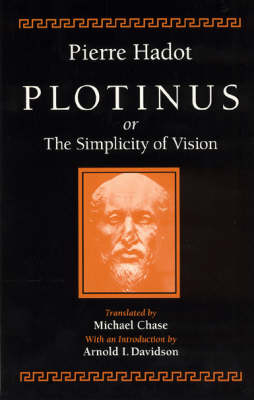
Plotinus or the Simplicity of Vision
Seiten
1998
University of Chicago Press (Verlag)
978-0-226-31194-4 (ISBN)
University of Chicago Press (Verlag)
978-0-226-31194-4 (ISBN)
In this work, Hadot examines Plotinus' views on the self, existence, love, virtue, gentleness and solitude. He shows that Plotinus, like other philosophers of his day, believed that Plato and Aristotle had already articulated the essential truths, and so his purpose was to live philosophically.
Since its original publication in France in 1963, Pierre Hadot's lively philosophical portrait of Plotinus remains the preeminent introduction to the man and his thought. Michael Chase's lucid translation--complete with a useful chronology and analytical bibliography--at last makes this book available to the English-speaking world. Hadot carefully examines Plotinus's views on the self, existence, love, virtue, gentleness, and solitude. He shows that Plotinus, like other philosophers of his day, believed that Plato and Aristotle had already articulated the essential truths; for him, the purpose of practicing philosophy was not to profess new truths but to engage in spiritual exercises so as to live philosophically. Seen in this light, Plotinus's counsel against fixation on the body and all earthly matters stemmed not from disgust or fear, but rather from his awareness of the negative effect that bodily preoccupation and material concern could have on spiritual exercises.
Since its original publication in France in 1963, Pierre Hadot's lively philosophical portrait of Plotinus remains the preeminent introduction to the man and his thought. Michael Chase's lucid translation--complete with a useful chronology and analytical bibliography--at last makes this book available to the English-speaking world. Hadot carefully examines Plotinus's views on the self, existence, love, virtue, gentleness, and solitude. He shows that Plotinus, like other philosophers of his day, believed that Plato and Aristotle had already articulated the essential truths; for him, the purpose of practicing philosophy was not to profess new truths but to engage in spiritual exercises so as to live philosophically. Seen in this light, Plotinus's counsel against fixation on the body and all earthly matters stemmed not from disgust or fear, but rather from his awareness of the negative effect that bodily preoccupation and material concern could have on spiritual exercises.
Translator's Preface Abbreviations Used in References Introduction: Reading Hadot Reading Plotinus by Arnold I. Davidson 1: Portrait 2: Levels of the Self 3: Presence 4: Love 5: Virtues 6: Gentleness 7: Solitude Postface to the Third Edition Chronological Biography Analytical Bibliography References Index of Plotinian Quotations Index
| Erscheint lt. Verlag | 14.5.1998 |
|---|---|
| Übersetzer | Michael Chase |
| Sprache | englisch |
| Maße | 14 x 22 mm |
| Gewicht | 198 g |
| Themenwelt | Geisteswissenschaften ► Philosophie ► Philosophie Altertum / Antike |
| ISBN-10 | 0-226-31194-5 / 0226311945 |
| ISBN-13 | 978-0-226-31194-4 / 9780226311944 |
| Zustand | Neuware |
| Haben Sie eine Frage zum Produkt? |
Mehr entdecken
aus dem Bereich
aus dem Bereich
mit Sokrates, Seneca, Platon & Co. im Gespräch
Buch | Hardcover (2023)
FinanzBuch Verlag
CHF 25,20


